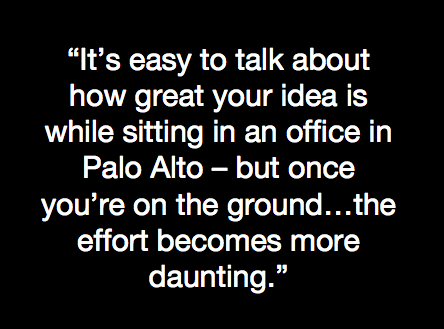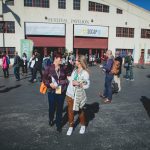This article is written by Justin Noodleman, an MBA Candidate at Kellogg School of Management.
———————
The team at REwiRE (Rural Electrification with Renewable Energy) is doing something complex and challenging: financing, developing, and managing renewable energy-powered mini-grids in emerging markets. Given the challenge, it’s fascinating that when you talk to them, they’re laser focused on simplicity and execution. It’s common for great ideas to be thrown out in a classroom setting, and they often sound great on paper, but represent enormous challenges in practice. This pattern is in place for RewiRE.
 CEO Jonathan Strahl pointed out how it’s easy to talk about how good your idea is while sitting in an office in Palo Alto – but when you’re on the ground in Indonesia and start considering the local landscape, a new culture, an unfamiliar legal system, and countless other variables, the effort becomes more daunting.
CEO Jonathan Strahl pointed out how it’s easy to talk about how good your idea is while sitting in an office in Palo Alto – but when you’re on the ground in Indonesia and start considering the local landscape, a new culture, an unfamiliar legal system, and countless other variables, the effort becomes more daunting.
Through a whirldwind that took the team through the concept at Stanford to their success at the International Impact Investing Challenge last year and beyond, REwiRE is set for its pilot project in Indonesia. The team is highly self-aware at what they can and cannot do – and that’s led to an ecosystem of partners that will facilitate REwiRE’s success going forward.
Finding the right partners
The on-the-ground partner, Ibeka, has been instrumental in helping the team understand the cultural and legal barriers that exist in Indonesia. They have extensive experience on the technology and engineering side as well as project management expertise: they’ve helped with community outreach and feasibility studies. The folks at REwiRE recognize that they have limitations in truly understanding the local Indonesian culture, underscoring Ibeka’s importance in the mission.
The team is also working closely with Engineers for a Sustainable World, a Stanford non-profit that “aims to address the challenges of global poverty and sustainability by harnessing the energy and creativity of young engineers.” Jon noted that they’ve had a variety of mentors and supporters provide assistance along the way as they drive towards the initial goal of a successful pilot program. Of course, the team still needed to find a way to attract investors for this capital-intensive endeavor.
Evolution of the financial structure
It has been critical for REwiRE to line up the right partners to help, but first it was up to the team to develop an innovative financing model that would attract investors. The team created a holding company called REwiRE LLC that will manage investments from four different types of players: institutional investors (40%), the founders (5%), Impact Investors (25%), and Grants (30%). The money will flow directly to a joint venture between a local co-op and REwiRE as they build the grid to provide electricity to some of the most rural villages in Indonesia. Their business case estimates an expected 15.4% IRR (internal rate of return) and an NPV (net present value) of $1.77 million for the three mini-grids planned for the pilot project on Sumba Island.
Getting investments is a chicken and egg challenge, however – rural electrification is a capital intensive business, and investors want to see a track record. This is why the team talks about simplifying – it’s okay to have big plans (they do), but it’s critical to focus and build one grid to establish the credibility that will attract investors and allow them to scale.
Chief Technology Officer, Kelcie Abraham, described the financial model and how it evolved over the course of countless brainstorming sessions and conversations with partners. The original plan was to set up multiple sub-holding companies by phase, geographic region, or power source (solar, wind, hydro, etc.). Given the costs and challenges associated with setting up sub-holding companies for foreign private investment and various contract issues, the team adjusted the model to a single sub-holding company. They also simplified the community cooperative contracts, all in the name of streamlining and moving forward with an execution-based mindset.
Next steps
Kelcie spoke passionately about her experience of the difference between investing for impact, and impact investing. “It’s a new idea…you really have to think about trade-offs between financial returns, social returns, and environmental impact. In some ways, everyone is a social entrepreneur, and we’re all working together towards a better society.”
This project has required a great deal of planning and preparation, and COO Himani Phadke spoke for the team when she said she couldn’t wait to actually get the pilot project going. She also spoke to the excitement of working with so many inspirational people. “We’re expanding our network and meeting really interesting people that are trying to address some of the same challenges. It’s a pretty exciting opportunity to learn from them.”
It will be fun to watch the pilot project develop and to see REwiRE work towards a sustainable, scalable solution to electrification issues in rural areas in emerging markets.



